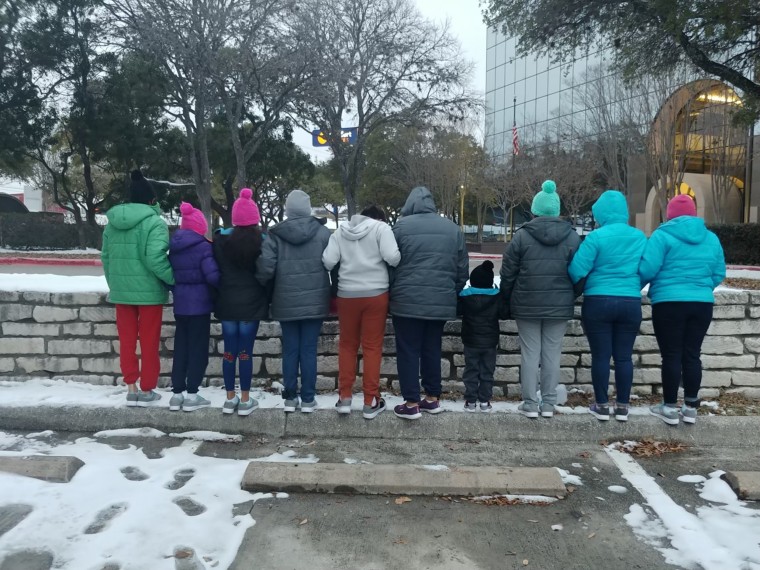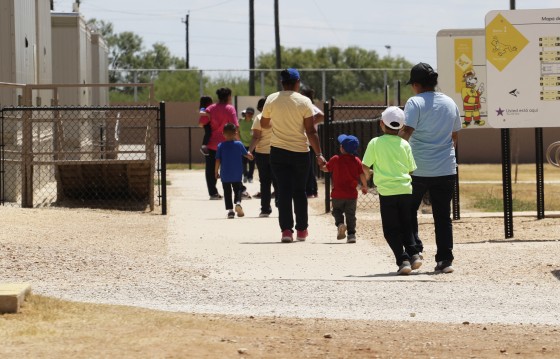WASHINGTON — The Biden administration is preparing a plan to drastically decrease the number of immigrant families in ICE detention, according to three sources familiar with the discussions.
The details of the plan are still being worked out by policy experts at the Department of Homeland Security, but it would all but eliminate the detention of families except in special circumstances, the sources said.
One question under discussion is who would handle the oversight of families once released to be sure they would appear at their immigration hearings.
As of Thursday, there were 489 family members detained together in ICE detention, according to a spokesperson for the agency, out of 14,000 total immigrants detained by ICE as they await court hearings or deportation.
"The goal is to wind down the number of families in detention as much as possible," said one person familiar with the discussions. "But getting to zero overnight seems out of reach."

The plan would place most families who enter the U.S. in "alternatives to detention," which could include ankle monitors or a program where they check in with a case manager on a regular basis, two sources familiar with the discussions said.
Proponents of detention have said it is the best way to guarantee families will show up to their court hearings, where it is determined whether they should be deported or granted asylum.
"Just look at the incentives we would create by not detaining family units. You're giving them what they came here for and the message goes back to their home countries, usually through cartels, that it's catch and release," said Rosemary Jenks, director of government relations at NumbersUSA, which advocates for reducing the number of immigrants who enter the U.S. annually.
But immigration advocates have pushed for alternatives to detention, arguing that most families show up to their court hearings if they are assigned a case manager to help them navigate the system.
Though he unveiled a number of immigration executive actions aimed at migrant families, including a task force to reunite families separated by the Trump administration, so far little has been known about Biden's plans to make good on a campaign promise of ending the detention of migrant families.
In June 2019, he tweeted: "Children should be released from ICE detention with their parents immediately. This is pretty simple, and I can't believe I have to say it: Families belong together."
The next month in a closed-door meeting Biden told lawmakers, many from the Congressional Hispanic Caucus, that he would end family detention if elected president.
Lawyers representing families detained in the South Texas Family Residential Center in Dilley, Texas, estimate roughly 400 migrant families remain in detention.
The current practice of detaining migrant families together began under the Obama administration in response to an influx of Central American families claiming asylum in the United States in 2014. The Trump administration sought to expand the length of time families could spend in detention by defying a federal court agreement known as the Flores settlement, which ruled that immigrant children should not be in detention longer than 20 days.
Spokespeople for DHS and ICE did not respond to a request for comment.
Just this week, the Biden administration released the last of a group of over 360 families who had been waiting as long as 18 months in ICE detention. Those families were never given the chance to claim asylum because they entered the United States under Trump's "transit ban," which prohibited immigrants from claiming asylum in the U.S. if they had passed through another country where they could have claimed asylum.
Shalyn Fluharty, director of the legal advocacy group Proyecto Dilley, which works with detained immigrant families at the South Texas Family Residential Center, said the release of the families was a step in the right direction.
"At this point, we're just asking President Biden to do what he's promised, which is to end family detention. That's not a heavy ask," Fluharty said.
Even for families who are released, life is not always easy. NBC News recently spoke to a Haitian mother and father who spent 10 months in ICE detention with their toddler. They were released in January and are currently waiting to find out if they will even have the chance to claim asylum, as the Trump administration denied them a hearing.
"We are glad that we have been released. But honestly, it's been very difficult. We have these ankle bracelets on our feet. We really don't know what the future holds," said the father, speaking through an interpreter. He asked to remain anonymous as he fears being targeted by the Haitian government if he is deported. "But at least now we are with our families."


